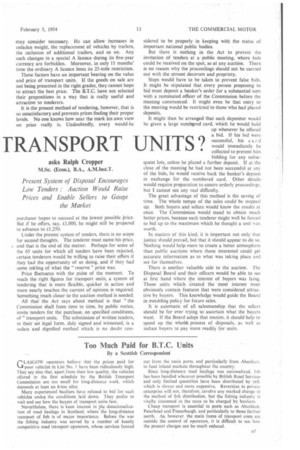Too Much Paid for B.T.C. Units By a Scottish Correspondent
Page 47

If you've noticed an error in this article please click here to report it so we can fix it.
GLASGOW operators believe that the prices paid for poor vehicles in List No. I have been ridiculously high. They say also that, apart from their low quality, the vehicles offered in the first schedule by the British Transport Commission are too small for long-distance work, which demands at least an 8-ton oiler.
Many experienced hauliers have refused to bid for such vehicles undeg the conditions laid down. They prefer to yvait and see how the buyers of transport units fare.
Nevertheless, there is keen interest in .t.he denationalization of road haulage in Scotland, where the long-distance transport of fish is of major importance. Before the war the fishing industry was served by a number of keenly competitive road transport operators, whose services fanned
out from the main ports, and particularly from Aberdeen, to feed inland markets throughout the country.
Since long-distance road haulage was nationalized, lish has been handled wherever possible by British Road Services and only limited quantities have been distributed by rail, which is slower and more expensive. Reversion to private . enterprise will not, therefore, involve any marked change in the method of fish distribution, but the fishing industry is vitally interested in the rates to be charged by hauliers.
Cheap transport is essential to ports such as Aberdeen, Peterhead and Fraserburgh, and particularly to those farther north. As, however, the main items of transport costs are outside the control of operators, it is difficult to see how the present charges can be much reduced.








































































































